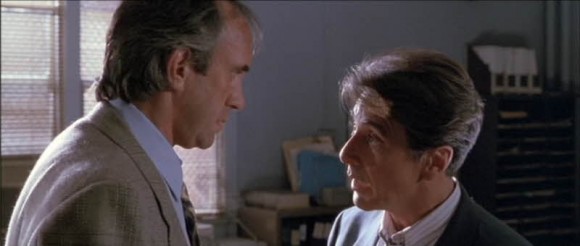
In my last post, I talked about how the psychic investment we make in films and television is made in exchange for two things: knowledge, including the way we know, and a sense, or fantasy, of agency. In this post, another film offers us a lesson in these departments.
There is a scene in Glengarry Glen Ross, a film based on a Broadway play written by David Mamet, that illustrates another kind of psychic investment we make. The film concerns four men who work in land sales office, trying any measures necessary to convince their marks that they should buy plots of land in Florida. The stakes for them are high – close deals, get “on the leader board,” and win a Cadillac, or be bounced out of a job. After being berated by a Rolex wearing suit from the head office, the salesmen get back to work and look with a mixture of envy and resentment to Richard Roma, who leads them all by far in deals closed.
Midway through the film, Roma makes his final speech to James Lingk, a man he meets in the restaurant across the street from the office. Roma’s approach to his job is sharply distinguished from the desperate efforts of his fellow salesmen. Instead of laying on the slick salesman routine, he has, up to this point, practically wooed James Lingk into a situation where he can make his pitch. The dynamic between them in the restaurant as they share drinks is romantic, even erotic. The discussion has turned from train compartments to remembrances of orgasms to everyday worries and anxieties. At this point in the film, the discussion has turned to the material things in life that allegedly give us pleasure:
Stocks, bonds, objects of art, real estate. What are they? An opportunity. To what? To make money? Perhaps. To lose money? Perhaps. To “indulge” and to “learn” about ourselves? Perhaps. So f***ing what? What isn’t? They’re an opportunity. That’s all they are. They’re an event. A guy comes to you, you make a call, you send in a card, “I have these properties I would like for you to see.” What does it mean? What do you want it to mean?
Like many of Mamet’s films and plays, Glengarry Glen Ross focuses on the con artist. Richard Roma is the master of the art in this film. We’re pretty sure that Roma has sold Lingk several plots of worthless land, and we see that his tactics for holding onto the sale are unscrupulous, but when we consider the relationship that he has developed with him, we can’t help but think that he genuinely cares about Lingk’s spiritual well-being. We can’t help but think that Lingk has made more than just an investment of money. He’s made a psychic investment into Roma’s narrative, such that he has claimed more personal agency and power than he has ever had in his life. Trying to convince Lingk to stick with the deal, Roma convinces Lingk to focus less on his nervous wife and more on himself:
I want to tell you something. Your life is your own. You have a contract with your wife. You have certain things you do jointly, you have a bond there…and there are other things. Those things are yours. You needn’t feel ashamed, you needn’t feel that you’re being untrue…or that she would abandon you if she knew. This is your life.

This film, as other Mamet films do, illustrates another important thing that’s at stake when we watch them: our own sense of power and agency. They do this by inviting us to consider what it means to lend credence to a narrative – whether that narrative comes from a salesman, a politician, or an artist.
Characters in Mamet plays and films are often intent on “telling” things to other characters: “I want to tell you something” is a frequent refrain. They are not telling things for the sake of telling them, though. Like Mamet’s films, his characters are telling stories in order to get the other person to believe, not just in the storyteller, but also in themself. It is the same with Richard Roma and James Lingk. To close the sale, Roma delicately unfolds a brochure and shows Lingk pictures of idyllic Florida landscapes. “Florida. Bullshit,” Roma acknowledges, but he nevertheless leans close into Lingk and consummates the relationship: “This is a piece of land. Listen to what I’m going to tell you now.”
We listen to our storytellers. Not simply because we enjoy their stories, but because they woo us, they entice us, into believing that we are powerful. Whether that power comes from our ego, or from our sense of how to engage ethically and morally with the story and the storyteller, is up to us to decide.







